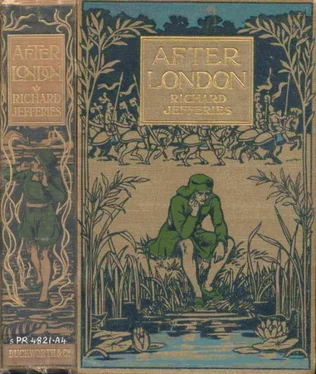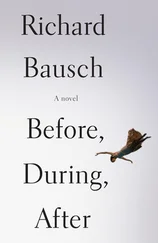Richard Jefferies - After London
Здесь есть возможность читать онлайн «Richard Jefferies - After London» весь текст электронной книги совершенно бесплатно (целиком полную версию без сокращений). В некоторых случаях можно слушать аудио, скачать через торрент в формате fb2 и присутствует краткое содержание. Город: London, Год выпуска: 1905, Издательство: Duckworth & Co., Жанр: sf_postapocalyptic, на английском языке. Описание произведения, (предисловие) а так же отзывы посетителей доступны на портале библиотеки ЛибКат.
- Название:After London
- Автор:
- Издательство:Duckworth & Co.
- Жанр:
- Год:1905
- Город:London
- ISBN:нет данных
- Рейтинг книги:4 / 5. Голосов: 1
-
Избранное:Добавить в избранное
- Отзывы:
-
Ваша оценка:
- 80
- 1
- 2
- 3
- 4
- 5
After London: краткое содержание, описание и аннотация
Предлагаем к чтению аннотацию, описание, краткое содержание или предисловие (зависит от того, что написал сам автор книги «After London»). Если вы не нашли необходимую информацию о книге — напишите в комментариях, мы постараемся отыскать её.
(1885), set in a future in which urban civilization has collapsed after an environmental crisis.” (From
).
This eBook is for the use of anyone anywhere at no cost and with almost no restrictions whatsoever. You may copy it, give it away or re-use it under the terms of the Project Gutenberg License included with this eBook or online at
* * *
After London — читать онлайн бесплатно полную книгу (весь текст) целиком
Ниже представлен текст книги, разбитый по страницам. Система сохранения места последней прочитанной страницы, позволяет с удобством читать онлайн бесплатно книгу «After London», без необходимости каждый раз заново искать на чём Вы остановились. Поставьте закладку, и сможете в любой момент перейти на страницу, на которой закончили чтение.
Интервал:
Закладка:
He drew her up as far as his strength permitted, and not only took down the sail, but unshipped the mast; then cutting a quantity of dead reeds, he scattered them over her, so that, unless a boat passed very close to the land, she would not be seen. While he had a meal he considered how he had better proceed. The only arms with which he excelled were the bow and arrow; clearly, therefore, if he wished an engagement, he should take these with him, and exhibit his skill. But well he knew the utter absence of law and justice except for the powerful. His bow, which he so greatly valued, and which was so well seasoned, and could be relied upon, might be taken from him.
His arrows, so carefully prepared from chosen wood, and pointed with steel, might be seized. Both bow and arrows were far superior to those used by the hunters and soldiery, and he dreaded losing them. There was his crossbow, but it was weak, and intended for killing only small game, as birds, and at short range. He could make no display with that. Sword he had none for defence; there remained only his boar spear, and with this he resolved to be content, trusting to obtain the loan of a bow when the time came to display his skill, and that fortune would enable him to triumph with an inferior weapon.
After resting awhile and stretching his limbs, cramped in the canoe, he set out (carrying his boar-spear only) along the shore, for the thick growth of the firs would not let him penetrate in the direction he had seen the tower. He had to force his way through the reeds and flags and brushwood, which flourished between the firs and the water’s edge. It was hard work walking, or rather pushing through these obstacles, and he rejoiced when he emerged upon the slope of a down where there was an open sward, and but a few scattered groups of firs. The fact of it being open, and the shortness of the sward, showed at once that it was used for grazing purposes for cattle and sheep. Here he could walk freely, and soon reached the top. Thence the city was visible almost underneath him.
It stood at the base of a low narrow promontory, which ran a long way into the Lake. The narrow bank, near where it joined the mainland, was penetrated by a channel or creek, about a hundred yards wide, or less, which channel appeared to enter the land and was lost from sight of among the trees. Beyond this channel a river ran into the lake, and in the Y, between the creek and the river, the city had been built.
It was surrounded with a brick wall, and there were two large round brick towers on the land side, which indicated the position of the castle and palace. The space enclosed by the walls was not more than half a mile square, and the houses did not occupy nearly all of it. There were open places, gardens, and even small paddocks among them. None of the houses were more than two storeys high, but what at once struck a stranger was the fact that they were all roofed with red tiles, most of the houses of that day being thatched or covered with shingles of wood. As Felix afterwards learnt, this had been effected during the reign of the present king, whose object was to protect his city from being set on fire by burning arrows. The encircling wall had become a dull red hue from the long exposure to the weather, but the roofs were a brighter red. There was no ensign flying on either of the towers, from which he concluded that the king at that moment was absent.
CHAPTER XVI
THE CITY
Slowly descending towards the city, Felix looked in vain for any means of crossing the channel or creek, which extended upon the side of it, and in which he counted twenty-two merchant vessels at anchor, or moored to the bank, besides a number of smaller craft and boats. The ship of war, which had arrived before him, was beached close up by a gate of the city, which opened on the creek or port, and her crew were busily engaged discharging her stores. As he walked beside the creek trying to call the attention of some boatman to take him across, he was impressed by the silence, for though the city wall was not much more than a stone’s throw distant, there was none of the usual hum which arises from the movements of people. On looking closer he noticed, too, that there were few persons on the merchant vessels, and not one gang at work loading or unloading. Except the warder stalking to and fro on the wall, and the crew of the war-ship, there was no one visible. As the warder paced to and fro the blade of his partisan gleamed in the sunshine. He must have seen Felix, but with military indifference did not pay the slightest heed to the latter’s efforts to attract his attention.
He now passed the war-ship, and shouted to the men at work, who were, he could see, carrying sheaves of arrows and bundles of javelins from the vessel and placing them on carts; but they did not trouble to reply. His common dress and ordinary appearance did not inspire them with any hope of payment from him if they obliged him with a boat. The utter indifference with which his approach was seen showed him the contempt in which he was held.
Looking round to see if there were no bridge or ferry, he caught sight of the grey church tower which he had observed from afar while sailing. It was quite a mile from the city, and isolated outside the walls. It stood on the slope of the hill, over whose summit the tower was visible. He wandered up towards it, as there were usually people in or about the churches, which were always open day and night. If no one else, the porter in the lodge at the church door would be there, for he or his representative never left it, being always on the watch lest some thief should attempt to enter the treasury, or steal the sacred vessels.
But as he ascended the hill he met a shepherd, whose dogs prepared to fly at him, recognising a stranger. For a moment the man seemed inclined to let them wreak their will, if they could, for he also felt inclined to challenge a stranger, but, seeing Felix lower his spear, it probably occurred to him that some of his dogs would be killed. He therefore ordered them down, and stayed to listen. Felix learnt that there was no bridge across the creek, and only one over the river; but there was a ferry for anybody who was known. No strangers were allowed to cross the ferry; they must enter by the main road over the bridge.
“But how am I to get into the place then?” said Felix. The shepherd shook his head, and said he could not tell him, and walked away about his business.
Discouraged at these trifling vexations, which seemed to cross his path at every step, Felix found his way to the ferry, but, as the shepherd had said, the boatman refused to carry him, being a stranger. No persuasion could move him; nor the offer of a small silver coin, worth about ten times his fare.
“I must then swim across,” said Felix, preparing to take off his clothes.
“Swim, if you like,” said the boatman, with a grim smile; “but you will never land.”
“Why not?”
“Because the warder will let drive at you with an arrow.”
Felix looked, and saw that he was opposite the extreme angle of the city wall, a point usually guarded with care. There was a warder stalking to and fro; he carried a partisan, but, of course, might have his bow within reach, or could probably call to the soldiers of the guard.
“This is annoying,” said Felix, ready to give up his enterprise. “How ever can I get into the city?”
The old boatman grinned, but said nothing, and returned to a net which he was mending. He made no answer to the further questions Felix put to him. Felix then shouted to the warder; the soldier looked once, but paid no more heed. Felix walked a little way and sat down on the grass. He was deeply discouraged. These repulses, trifles in themselves, assumed an importance, because his mind had long been strung up to a high pitch of tension. A stolid man would have thought nothing of them. After a while he arose, again asking himself how should he become a leader, who had not the perseverance to enter a city in peaceful guise?
Читать дальшеИнтервал:
Закладка:
Похожие книги на «After London»
Представляем Вашему вниманию похожие книги на «After London» списком для выбора. Мы отобрали схожую по названию и смыслу литературу в надежде предоставить читателям больше вариантов отыскать новые, интересные, ещё непрочитанные произведения.
Обсуждение, отзывы о книге «After London» и просто собственные мнения читателей. Оставьте ваши комментарии, напишите, что Вы думаете о произведении, его смысле или главных героях. Укажите что конкретно понравилось, а что нет, и почему Вы так считаете.












